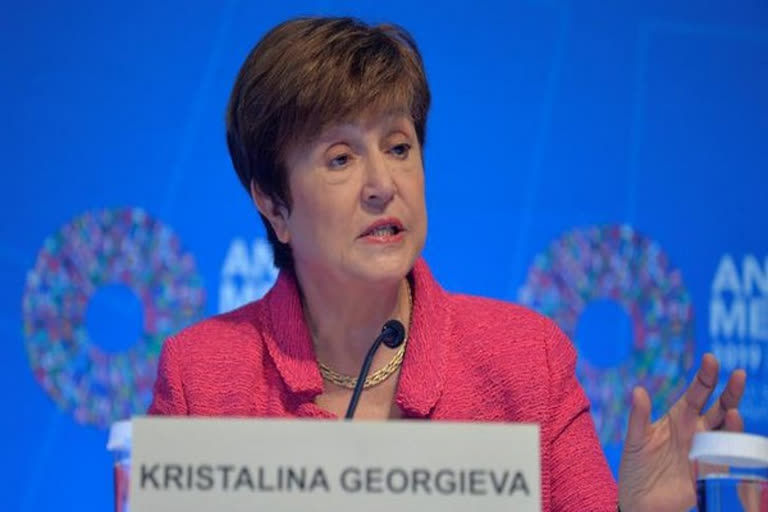Washington: The International Monetary Fund on Thursday urged policy makers across the world to act now to bring down inflation, put in place responsible fiscal policy, safeguard financial stability and carry reforms to address climate change, make digitalisation work for people and address inequality. Speaking to reporters at a press conference here, IMF Managing Director Kristalina Georgieva said, "The IMF is working with our 190 members on these issues. Our economic analysis is front and centre to help countries navigate this complex environment and avoid policy mistakes."
Describing it as a difficult global environment, Georgieva said the world economy has been hit by one shock after another the coronavirus pandemic, Russia's invasion of Ukraine and climate disasters on every continent. They continue to harm people's lives and they have caused a cost-of-living crisis, she noted. The immediate toll is clear. On Tuesday, we cut our global growth forecast to 2.7 per cent in 2023. Across many economies, the risks of recession are rising. And even when growth is positive, for many people, it will feel like a recession because of rising prices and shrinking real incomes, she said.
On top of this, risks to financial stability are growing and uncertainty remains exceptionally high. Our World Economic Outlook shows a one-in-four chance that global growth could drop to a historic low of 2 per cent next year, she said. These repeated shocks and growth setbacks raise a bigger question: are we experiencing a fundamental economic shift in the world economy from a world of relative predictability and stability, to greater uncertainty and volatility, she said.
Georgieva said the IMF sees very clear areas where they can do better, even in this more complex environment. First, bring inflation down. We know that rising interest rates come at a cost to growth. But we also know that not tightening enough to put a leash on inflation would mean interest rates staying higher for longer, resulting in even more harm to growth and people. For central banks, this means taking decisive action when necessary, and communicating as clearly as they can, she said.
Second, act now to put in place responsible fiscal policy. We must prioritise protecting vulnerable households and businesses. But we have to do that at a time when fiscal buffers are exhausted because of the pandemic and levels of debt are very high. The obvious conclusion is that policy measures need to be temporary and well-targeted. Steer away from across-the-board fiscal support that is neither effective nor affordable, she said.
If we are to help people and fight inflation, we must ensure that fiscal and monetary policies go hand in hand. When monetary policy hits the brakes, fiscal policy should not step on the accelerator that would make for a very dangerous ride, she said. Third, act now to safeguard financial stability, particularly as we see rising financial sector risks. Macroprudential policies need to be even more vigilant and proactively address pockets of vulnerability, Georgieva said.
In this environment, we also must support vulnerable emerging markets and developing countries. It is tough for everybody, but it is even tougher for countries that are now being hit by a stronger dollar, high borrowing costs, and capital outflows a triple blow that is particularly heavy for countries that are under a high level of debt, she said.
We are focusing on debt this week, especially for low-income countries where over 60 per cent are at or near debt distress. We need stronger efforts to confront food insecurity 345 million people are acutely food insecure. Children, women, and men are at risk of dying because of hunger, said the managing director, " she said. We need transformational reforms to address climate change, to make digitalisation work for people, and to address inequality. To confront these issues, we must act with sense of urgency now, and we must act together, Georgieva said. (PTI)



